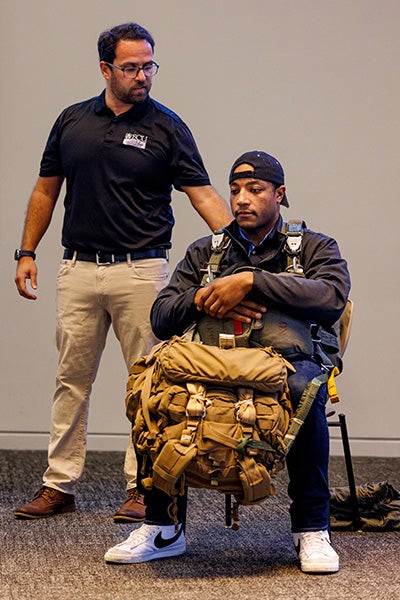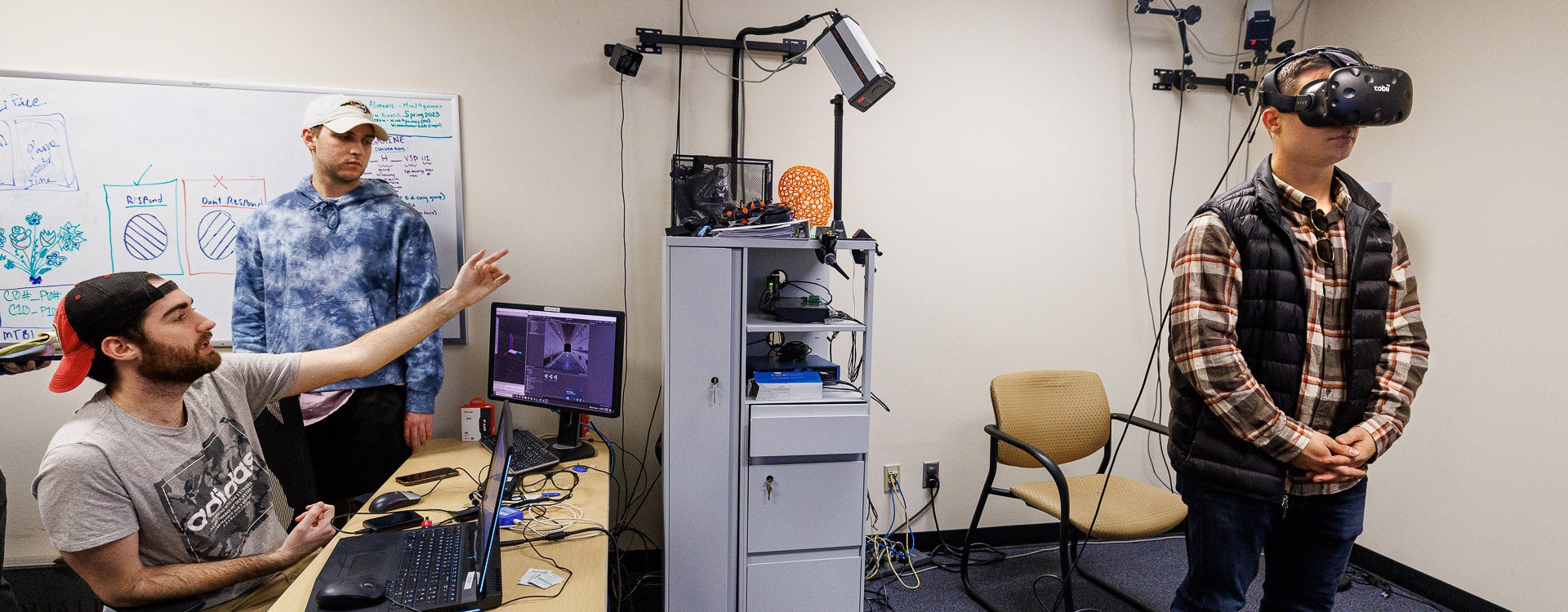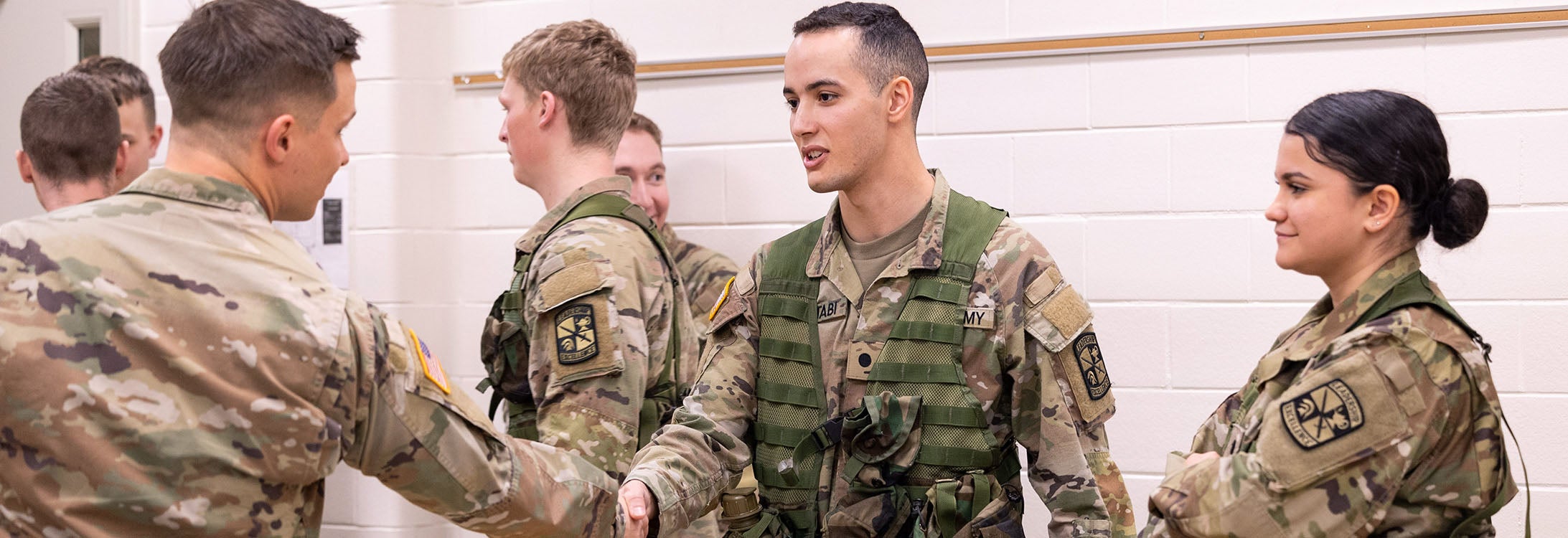LAYERS OF TOPICS
Visit brings Army special operations leaders to ECU for wisdom sharing
Whether it was a United States Army captain speaking to an Army ROTC cadet about career aspirations, East Carolina University head football coach Mike Houston discussing team chemistry with Army leaders, or kinesiology instructor Patrick Rider using a military backpack demonstration and video analysis to examine body movement shifts, a blend of military, faculty and athletics personnel presented a range of dynamic conversations.
Despite the versatility in topics — stress, leadership, neurons, recruiting, injuries — participants learned from each other no matter their rank or area of expertise.

A cadet raises his hand as Pender speaks to a group of ROTC students at ECU. (ECU photo by Rhett Butler)
This opportunity was made possible when the Department of Kinesiology, in the College of Health and Human Performance, and Army ROTC recently hosted the 112th Special Operations Signal Battalion (Airborne) from Fort Bragg.
“We’re going to move up the ranks one day, but I think it shows that they care about what you want to do as a person,” said ROTC cadet Abbey Drye after a small group Q&A session with battalion members. “I’m pushing to try to get the job I want. This showed that they cared enough to share what we should do or need to do and to get on certain points and tips. They want you to be the best.”
ECU Athletics representatives assisted in the one-day visit, organized by kinesiology assistant professor Christine Habeeb and Army ROTC Lt. Col. Josh Aeschliman.
“I wasn’t sure what to expect from the day, but I feel like I learned just as much as our visitors learned,” said Habeeb, who has a doctorate in sport psychology and is director of the Optimizing Psychology in Team Performance Settings research lab in Minges Coliseum. “It was fun to be brought out of my research silo that focuses on athlete confidence.
“Each faculty member who supported the day did a great job in showcasing and applying their work for an Army setting. Coaches were opening up about their realities and that seemed to resonate a lot, too. My goal was to build a relationship with Army leaders. I think the day opened up more connections than I thought were possible. This relationship is something I hope we continue to maintain in the future.”
In the lab
Rider, along with faculty members Zac Domire and Nicholas Murray, set up demonstrations and talked with Army representatives about applications.

Kinesiology instructor Patrick Rider, left, guides a body movement demonstration involving the 112th Special Operations Signal Battalion (Airborne). (ECU photo by Cliff Hollis)
Rider focused on video analysis of muscle usage and specific movements. Murray was in the Visual Motor Lab, and he emphasized why he and colleagues study the long-term impact of head injuries. Virtual reality tasks and tracking eye movement help Murray stress that “movements are decisions,” whether made by an athlete or someone in a military population.
“With vision and what we find in people who still have some impact from a head injury, there will be a lot more variability and they will not be consistently following a red dot around,” Murray said. “They will be either behind it or have a lot more variability in their movements to it. This requires integration of different brain areas in order to do this task, so if you have some disruption in that integration, then you tend to do this task worse. … What we all want is to have steady vision and longer fixations.”
Operations Sgt. Maj. Jessica Alicea-Cavezza said some of Murray’s demonstrations piqued her interest because it led her to think more about her medical history.
“I’ve been in the military 19 and a half years, Airborne for half of it, and have sustained concussions, I’ve fractured my ankle and had injuries where I couldn’t move my arms well,” she said. “Some of the different injuries I had early on in my Airborne timeline, and now I’m noticing some issues. As a leader, you’re not going to get yourself checked because you have to be out front. Now, I’m more tolerant to actually have myself evaluated and noticing some physical differences. Seeing the doctor and doing more talking, they want to go deeper and do more testing to see. … I’ve liked this (visit to ECU), and I think the military definitely, for what we do, cares about its patients.
“It’s just crazy what we put our bodies through. We should have some type of testing or a consistent way of assessing and evaluating our bodies and finding ways to improve and maintain performance.”
Army visitor David Hol talked with Domire in the Performance Optimization Lab about neurons, brain activity and tissue stiffness as it relates to injuries, even the possibility of injury predictability.
“Of course we can pull a book or go to YouTube, but this can help really understand muscle groups and preventatives and risk of injury,” Hol said. “I see it for myself that if I have a heavy load on myself, I’ll try to find my balance and might stumble a little because I’m compensating for weight. It’s the same thing while falling out of the sky. It’s not natural to fall out of the sky, but you have to prepare yourself mentally and physically. You’re sending neurons to your body to need to bend your knees or put your arms together, so this is actually helping me to readjust my assessment of falling out of the sky and preparing for weightlifting or later on just going on a nice little jog on a Sunday.”
Coaches corner
Houston was joined by ECU head women’s soccer coach Gary Higgins, track and field assistant coach Udon Cheek, and assistant strength and conditioning coach Dennis Wilson. There also were psychology and coaching sessions led by Habeeb and Tom Raedeke, professor and director of graduate studies in the Department of Kinesiology.
The quartet of Pirate coaches fielded questions ranging from the management of star players to the impact of injuries, recruiting strategy and the importance of player leadership.
“A big thing, I think, is trying to get everybody to buy in to what the commitment and what the goal of the team is,” Houston said. “I think teamwork is so important.”
Higgins said sport psychology is one of his team pillars.
“One of the first relationships I built when I got on campus here last year was in sports psychology and the College of Health and Human Performance,” he said. “That’s because at this level, every team is going to be good and it raises up that sports psychology is really important.”
‘Like a glimpse’
The day ended with a special opportunity for Army ROTC cadets to learn from members of the 112th Special Operations Signal Battalion (Airborne). Groups of cadets rotated in a classroom setting, engaging in an open forum to ask questions to the Army leaders.
“They brought us out of the picture a little bit,” cadet Aly Graham said. “We do this every day, and we’re in the moment and thinking of the next thing to do. They know it’s our temporary situation, but soon, you’re going to be doing this and doing that. It was kind of like a glimpse and shows it’s something to look forward to.”
Drye left the classroom session feeling motivated and eager.
“Keep pushing,” Drye said. “They are successful, and everyone wants to be successful.”

A virtual reality task is performed and reviewed in the Visual Motor Lab in Minges Coliseum. (ECU photo by Cliff Hollis)
